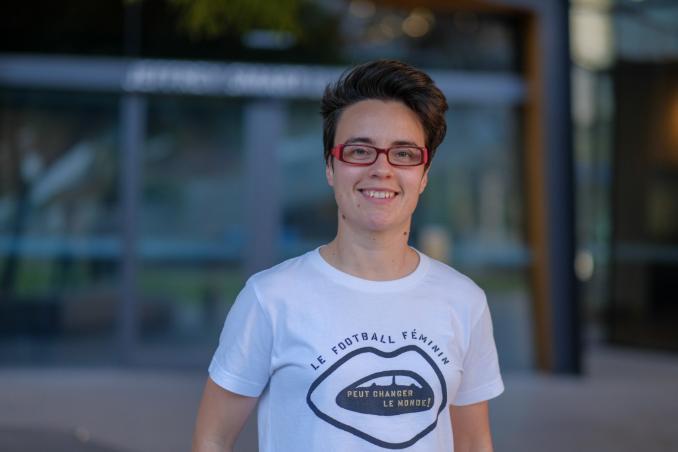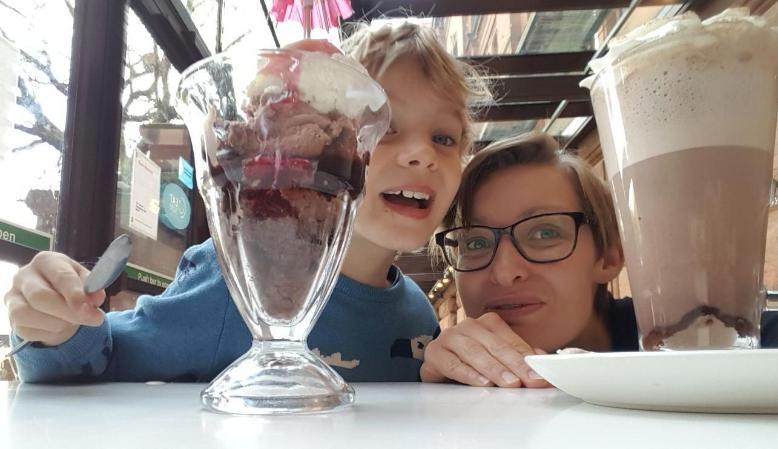College of Arts Case Studies
The Transitions Survey was originally conducted in Autumn 2019 in order to gather data about the post-graduation jobs of recent PhD graduates. Participants were asked about their roles, the transition into their roles, and their advice for current PhDs to make the most of their PhD experience and prepare for post-PhD life and job searching. Those participating in the case studies included here also had the opportunity to update their responses in Summer 2020.
Below you will find the case studies from participants who graduated from the College of Arts.
Niamh Brown, School of Critical Studies
Employment
Learning and Development Consultant at Money Advice Scotland, a Glasgow-based charity.
Three weeks for initial entry to the organisation and 18 months for current role.
What does your role entail?
I run our Wellbeing project, which involves running research and training on wellbeing among advisers in the free sector.
What do you like and dislike about your current role?
I like that my current role gives me a chance to research, write and teach – the three things I have always wanted to do. I have gained a lot of specialist knowledge and find the role to be an interesting challenge. It has also given me some policy/research experience outside of academia which will be valuable going forward.
How did your doctorate lead to your current post?
During my PhD, I was a Graduate Teaching Assistant, and I undertook two internships at the university. These jobs were my favourite parts of my PhD, which made me realise that academia was probably not for me. After graduating, I looked for work in the charity sector as a stop-gap. I got a job at my current organisation as an administrator based on one of my internships, then got two promotions due to my teaching experience, the second of which was to my current role. I knew I wanted a job that involved research, writing and teaching, which made me think academia would be a good fit. It wasn’t, but the transferrable skills I gained prepared me for other, more suitable roles which involved some of the same elements.
Transitioning to Employment
What was most helpful to you in managing your transition on from your PhD?
By the time I finished my PhD I was ready to leave academia, so my transition was aided by my eagerness for something new. My supervisor and the careers service also offered good advice and support.
What did you find most challenging in making the transition?
Moving to a much more structured day – someone else’s timetable rather than my own – was a challenge. I also dealt with some anxieties around moving out of academia, even though I was ready to do so.
The PhD
What advice would you give in terms of making the most of the PhD experience?
I went for a lot of opportunities not tied directly to my PhD such as internships, teaching, and a leadership course which gave attendees a management qualification, which were all really helpful and enjoyable for me. I would therefore advise PhD researchers to go for as wide a range of opportunities as possible during their studies as they do not know where this will take them.
Clare Edwards, School of Culture and Creative Arts
Employment
Cultural Regeneration Officer at Renfrewshire Council.
Position secured before graduation.
What does your role entail?
As Cultural Regeneration Officer at Renfrewshire Council, I’m working on the Future Paisley cultural regeneration programme in which the council is investing over £100m over the next few years. Future Paisley is wide-ranging and involves a partnership of 22 organisations, including national bodies such as the NHS, Police Scotland and Creative Scotland alongside universities and local third sector organisations such as Star Project and Engage Renfrewshire. I’m part of a small team responsible for developing an overarching, collaborative and unifying approach to cultural regeneration in Paisley set within the context of social change and transformation. My role involves providing cultural policy expertise, identifying new opportunities, delivering existing commitments and developing relationships and partnerships.
What do you like and dislike about your current role?
I love being able to apply into practice the theory and research I developed during my PhD, and that it's having an impact on communities. I like the job being rooted in the place of Paisley and being able to see it change and develop. I like the breadth of the role, that it covers areas as diverse as health, education and capital projects as well as cultural events – it's really varied and there's so much to learn, and lots of interesting people to learn from. I also like the relative job stability, having a permanent contract and much more reasonable work-life balance than if I'd stayed in academia – this was crucial to me as a parent in making decisions about my career. There’s nothing I really dislike about it!
How did your doctorate lead to your current post?
My PhD was in culture-led regeneration in Glasgow, so directly related to my job. I also did a collaborative doctoral award PhD with Glasgow Life, the arms-length organisation responsible for delivering culture and sport in Glasgow, which influenced my career decisions.
What career progression tips would you offer to researchers if they want to follow a similar path to your own?
Talk to the careers service about careers outside academia and get some practical experience through, for example, an internship. The careers service might also be able to put you in touch with people working in the fields you’re interested in. Also having a baby in the middle of your PhD is as good a time as any so don’t let that put you off.
Transitioning to Employment
What was most helpful to you in managing your transition on from your PhD?
The careers service was really helpful, as were my supervisors. I also did the Postgraduate Leadership Programme run by Researcher Development during my PhD, which I’d recommend to anyone.
What did you find most challenging in making the transition?
Not having a proper break between finishing my PhD and starting my job. My job was advertised before I’d finished my PhD and it was too good an opportunity to miss. I had an extended period of trying to keep too many plates spinning at once, completing the PhD while working and looking after two small children and dealing with other family emergencies, which was quite tricky and not something I’d recommend.
The PhD
What advice would you give in terms of making the most of the PhD experience?
The opportunities are limitless but remember what your priorities are (it should be things like your health as well as professional development and getting your thesis written!) and be selective about what additional responsibilities you take on. Also some of the most interesting career opportunities lie outside academia so be open to them and use this time to try out things you might want to do through opportunities such as internships.
What do you know now that you wish you had known then?
I was torn between an academic career and working in arts and cultural development, but I’ve found it’s possible to have a job that builds on my research and the things I enjoyed in my PhD in the world outside academia – and that the end of my PhD hasn’t meant the end of my involvement in research.
Noemi Llamas, School of Modern Languages & Cultures

Employment
Senior Student Services Adviser at the University of South Australia in Adelaide.
Position secured before graduation.
What does your role entail?
I lead a team of 10 advisers to assist in providing administrative support to students in the busiest city campus.
What do you like and dislike about your current role?
I love being able to give back to students and provide advice. I was a student for a really long time, and I owe finishing my various degrees to the people that guided me through the admin, bureaucracy, and rules (beyond academic support).
There is nothing specific I dislike about the role, although perhaps the fluctuating nature of the business requirements (really busy periods combined with really quiet periods) might be one - it’d be nice if it was more evenly spread across the year.
How did your doctorate lead to your current post?
It sort of didn’t. There was no requirement to finish my PhD to secure it. Me and my wife decided to move to Australia when I was in Thesis Pending status, and I secured a promotion to Senior during my submission process. I was a part-time PhD student from year 2 because of lack of funding, and I worked full time in the admin team at the SMLC during the first few years of my PhD. I realised early on that I had no interest in becoming an academic but I loved the higher education environment, so I continued to pursue my personal development in that area when I was in Glasgow, and then when I moved to Australia.
What career progression tips would you offer to researchers if they want to follow a similar path to your own?
I wouldn’t necessarily recommend my career path to anyone - I sort of adapted my skills to what I was good at and what I liked doing, and I wasn’t the perfect graduate.
Transitioning to Employment
What was most helpful to you in managing your transition on from your PhD?
Thinking about what comes next after the PhD whilst you are still doing the PhD is key. You may not know what the next job might look like exactly, but you can prepare for it with plenty of time. You can adapt your training, consult with people who are already doing what you would like to do, go to the right events, etc. I suppose this is the way to figure out exactly what you want to do, rather than defaulting to whatever is available after you finish.
What did you find most challenging in making the transition?
The transition process was really easy to me because I had been in the role before submission, during the corrections period (which was long and arduous), and graduation. Regaining my weekends was not challenging.
The PhD
What advice would you give in terms of making the most of the PhD experience?
I would advise candidates to put a lot of energy into everything else that is not thesis related. We spend a lot of time researching the actual topic and writing up, and that can lead to isolation and disengagement. Network, build relationships with your peers, participate in talks (even if you are not giving a presentation yourself). I started the Shut Up and Write and Peer Review groups and it really helped my writing and my connection to other candidates in my school and beyond. All those things will assist when trying to showcase to employers (particularly outside of academia) how your specific set of skills make you the best candidate for a job.
What do you know now that you wish you had known then?
I wish I had known at the start of my PhD that not all roads lead to an academic position, and that it is okay to want to work elsewhere. This would have made it easy on my expectations in the first couple of years. I suppose that was still early days to find out what I did not want to do, so my transition after completing the PhD was not really a transition at all.


